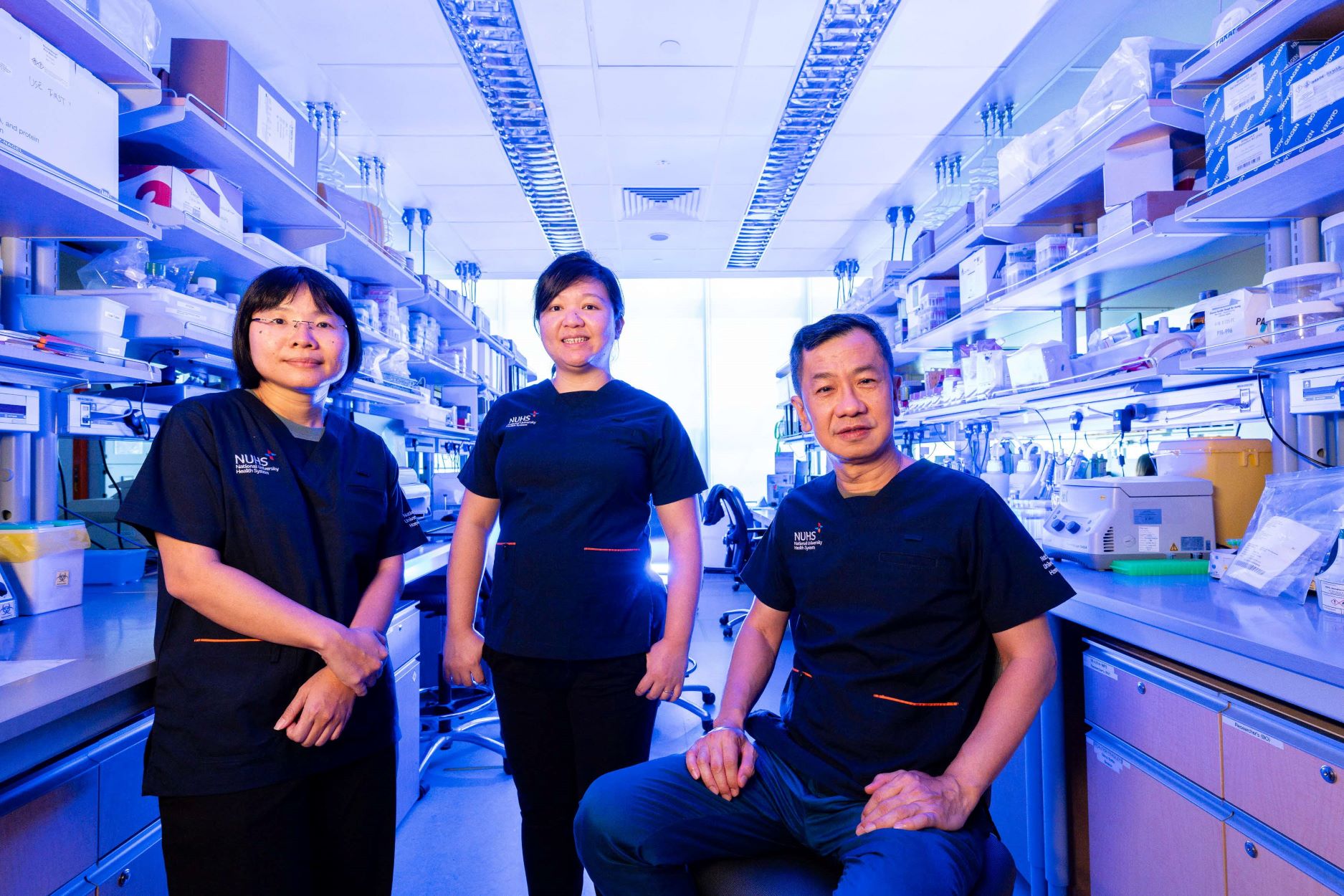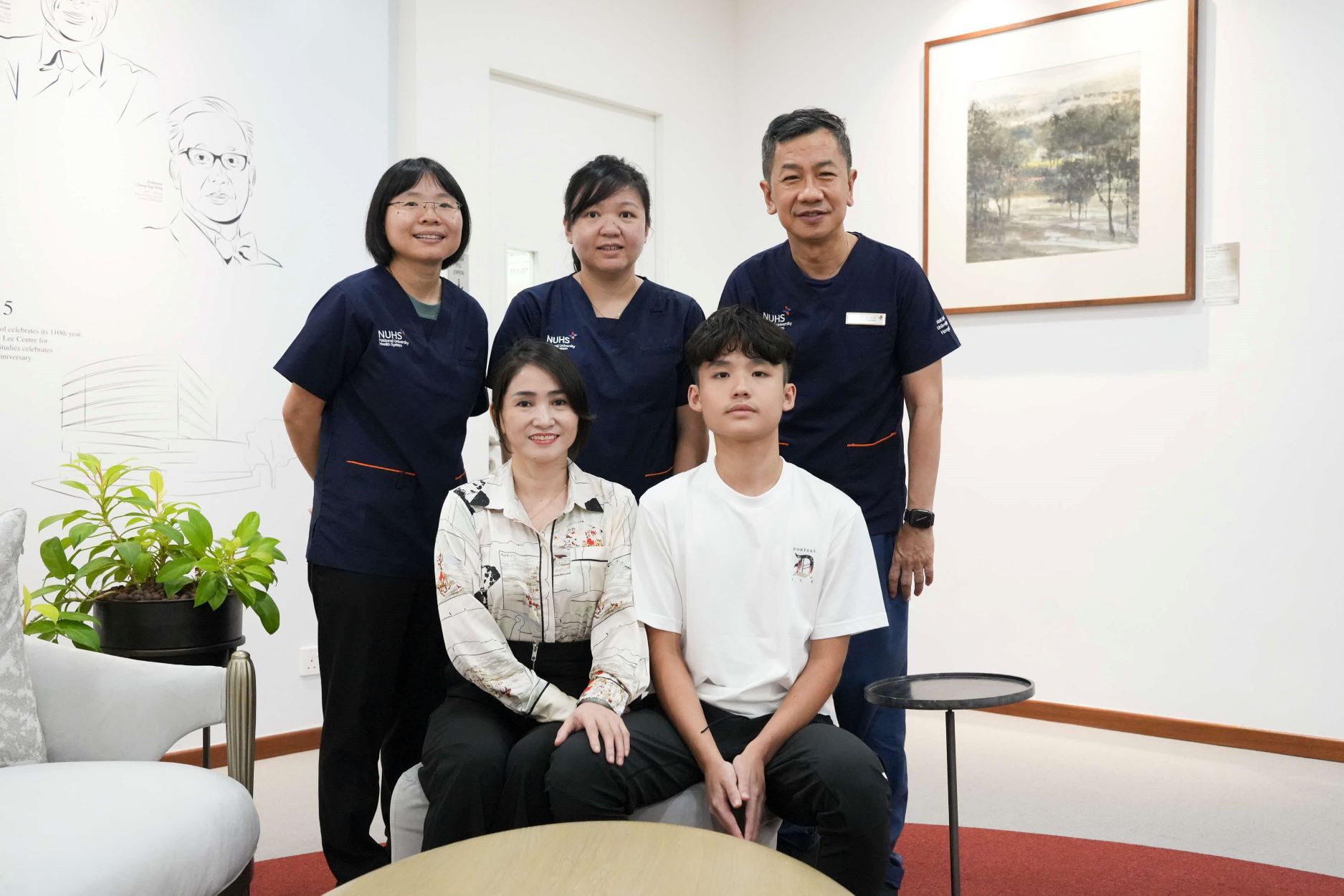CD7 CAR T-cell therapy offers a promising treatment for patients
with refractory or relapsed T-cell acute lymphoblastic leukaemia,
a rare type of blood cancer.
Issue 7 | December 2024

 Subscribe and ensure you don't miss the next issue!
Subscribe and ensure you don't miss the next issue!
Acute lymphoblastic leukaemia (ALL) accounts for 30 per cent of newly diagnosed childhood cancers in Singapore. Of these ALL cases, T-cell acute lymphoblastic leukaemia (T-ALL), constitutes approximately 10 per cent of ALL cases in children and 25 to 30 per cent in adolescents and young adults.
Conventional treatments, including chemotherapy and bone marrow transplants, are effective for roughly 80 per cent of T-ALL cases. However, for patients whose cancer relapses or does not respond to these treatments, survival rates are typically very low — below 10 per cent.
A new CD7 chimeric antigen receptor (CAR) T-cell therapy brings hope to those who have exhausted all standard treatment options. One such patient is Mrs Hannah Thomas, a 32-year-old Australian whose journey to remission began after undergoing the therapy at the National University Hospital (NUH).
A second chance at life
In March 2022, during a routine fertility check, Mrs Thomas was unexpectedly diagnosed with T-ALL. She then underwent six months of chemotherapy and a bone marrow transplant, which brought a brief remission — but the cancer soon returned. With her options in Australia running out, Mrs Thomas was referred to NUH by her haematologist, where she learnt about an experimental CD7 CAR T-cell therapy in development.
Following tests at NUH, Mrs Thomas received an infusion of anti-CD7 CAR T-cells in December 2023, just one day after her birthday. Within weeks, her cancer was in remission, and she returned to Australia in January 2024. A second bone marrow transplant from her brother in February further aided her recovery. Since then, she has been recovering well and working from home twice a week. She recently celebrated her 33rd birthday with friends, and is looking forward to her first Christmas with her family in Canberra since 2021.
“CD7 CAR T-cell therapy redirects our body’s immune defences to accurately identify and kill cancer cells with precision and efficacy,” explains Professor Allen Yeoh, Head and Senior Consultant with the Division of Paediatric Haematology and Oncology at the Khoo Teck Puat – National University Children’s Medical Institute (KTP–NUCMI)1, NUH. “Unlike conventional cancer chemotherapy, which can harm healthy cells, the therapy’s precision lowers the side effects while being highly effective.”
The therapy involves inserting an artificial genetic construct, known as CAR, into T-cells — a type of white blood cell that fights infections and diseases, including cancer. “First, we harvest T-cells from the patient. These harvested cells are then expanded and modified to express an artificial gene, known as anti-CD7 CAR. CAR is an artificial protein with two functions. First, it binds to CD7, a protein richly studded on the surface of cancer cells. After binding to CD7 on cancer cells, it signals the T-cell to kill. This dual function helps CAR T-cells to track down and kill the cancer cells. The modified T-cells are then re-injected into the patient, where they would get to work within minutes — recognising and destroying leukaemia cells which carry the CD7 protein on their surfaces,” explains Dr Bernice Oh, Consultant with the Division of Paediatric Haematology and Oncology at NUH’s KTP-NUCMI1, who led the clinical application of the new therapy.
This advanced treatment was first tested in 2019 on then 10-year-old Viet Tai, a Vietnamese boy whose cancer, like Mrs Thomas’s, did not respond to chemotherapy or second-line therapies. The experimental therapy was considered as a last resort after careful review and deliberation by NUH’s ethics board and between Viet Tai’s parents and Prof Yeoh. Within a month, the boy went from facing near death to being cancer-free to this day.

“I am very grateful to all of the doctors in Prof Yeoh’s team who saved me, especially Prof Yeoh. He made the right decision, which helped me return to a normal life,” says Viet Tai, who is now studying for his high school entrance exams in Vietnam and aspires to launch his own fashion brand.
Forging a new frontier in cancer treatment
The effectiveness of the CD7 CAR T-cell therapy was underscored in a recent study, of which Dr Bernice Oh was the first author.
The study involved 17 patients, among them Mrs Thomas, all of whom had failed more than three lines of treatment. Sixteen of them achieved complete remission within one month. Even highly sensitive flow cytometry tests, capable of detecting one cancer cell in 10,000 normal cells, found no trace of leukaemia cells.
“We are heartened that we could give patients who have exhausted all potentially curative options another clear chance at remission without severe side effects. We are committed to seeking better cures for patients with complex, treatment-resistant cancers,” says Dr Oh.
Prof Yeoh adds: “We are only at the beginning of this exciting journey. There is a lot of scientific and medical inquiry to be done to fully unlock the potential of CD7 CAR T-cells. Ultimately, for every member of our team, seeing patients smile and knowing they have been given another chance after remission is priceless.”
1KTP-NUCMI is part of the National University Centre for Women and Children (NUWoC), a national university specialist centre that aims to empower women, children and their families to lead healthier lives.
Like this article? Simply subscribe to make sure you don't miss the next issue of EnvisioningHealth!





















